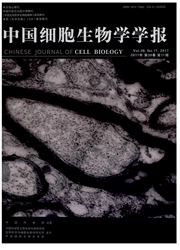

 中文摘要:
中文摘要:
自噬(autophagy)是一种在真核生物中十分保守的溶酶体依赖性降解途径,它通过形成双层膜结构包裹胞内堆积的蛋白质和受损细胞器并将其运送到溶酶体中进行降解。在实验中发现,一型磷脂酰肌醇4-磷酸5-激酶C亚型(type I phosphatidylinositol 4-phosphate 5-kinase isoform C,PIP5KIC)会参与到自噬过程中。在哺乳动物细胞中,敲低一型磷脂酰肌醇4-磷酸5-激酶C亚型会造成欧米茄体(omegasome)的形状异常,进而造成自噬水平的降低。同样,在酵母中敲掉其同源物磷脂酰肌醇5-激酶Mss4后也会导致类似的现象。因此,推测一型磷脂酰肌醇4-磷酸5-激酶C亚型在自噬体的生成中起着很重要的作用。
 英文摘要:
英文摘要:
Autophagy is a conserved lysosome-dependent degradative pathway in eukaryotes. During au- tophagy, autophagosomes engulf and deliver the accumulated proteins and damaged organelles to lysosomes for degradation. In our study, we found that type I phosphatidylinositol 4-phosphate 5-kinase isoform C (PIP5K/C) is involved in autophagosome formation. In mammalian cells, omegasome morphology is abnormal and autophagy level is decreased when PIP5KIC is knocked down. Similar phenotype was also found in yeast cells. The inactiva-tion of Mss4, which is the homologue of type I phosphatidylinositol 4-phosphate 5-kinase in yeast, leads to the reduction in autophagy level. Based on these evidences, we concluded that PIP5KIC plays an important role in au-tophagosome formation.
 同期刊论文项目
同期刊论文项目
 同项目期刊论文
同项目期刊论文
 期刊信息
期刊信息
